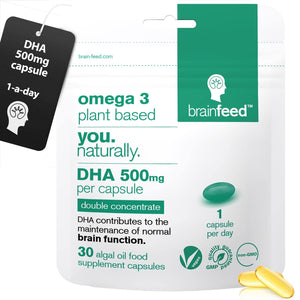Boost your well-being with omega 3: omega 3 for mood
filter
Do you also want to feel happy? Relaxed? Focused? Most people do. However, it’s easier said than done, especially when wondering what can help you. In this article, you’ll discover one of the most popular natural mood boosters you can count on, omega 3 fats, which are found in algae and fish oil. Omega 3’s impact on mood became apparent when researchers started exploring alternative treatments that may help alleviate depressive symptoms. Current findings suggest that omega 3 could be a safe and effective preventative measure and alternative support for symptoms of depression[1,2,3].
The mighty omega 3s
The popular omega 3 fats are essential nutrients found in algae and fish oil. There are multiple omega 3s with DHA and EPA being one of the most well-known. So, what does omega 3 fatty acid do? The European Food Safety Authority supports a few health claims regarding omega 3 positive effects on the mind and body of adults, such as DHA contributing to the maintenance of normal brain function[4]. Study results also frequently showed omega 3’s anti-inflammatory properties, which can help reduce the body’s defence mechanism known as inflammation[5,6,7,8]. Wondering why that’s important? Over the last few decades, inflammation has been identified as one of the main mechanisms underlying mental health conditions such as depression[8]. Current findings suggest omega 3 could support and regulate mood and mood disorders[1,2,3]. So, let’s take a closer look at omega 3 for mood, anxiety and omega 3 and depression.
Balance it out with omega 3
Depression is a complex mental health condition that can manifest in different ways, targeting the mind, soul and body. Inflammation in the body has been shown to worsen symptoms of depression[9]. So, what is inflammation and why does it start? Inflammation is part of the body's defence mechanism. It is the process by which the immune system recognizes foreign and harmful stimuli and begins the healing process[10]. Inflammation can be either acute or chronic, manifesting itself as a common cold or a few years-long depressive episode. That’s where healthy fats come to the rescue. Omega 3 can reduce depressive symptoms by acting anti-inflammatory as it produces special anti-inflammatory compounds known as SPMs or specialised pro-resolving mediators[8]. A review of studies that in total included 1366 participants with an average age of 14 years suggests that omega 3 may help reduce inflammation in the body, which could, in turn, help alleviate depressive symptoms[1]. The study found that anti-inflammatory treatments were effective in reducing depressive symptom severity in children and adolescents.
Omega 3 for a brighter mind
While dealing with a mental health condition that affects mood such as depression, some people may experience physical symptoms, such as changes in appetite or sleep patterns, while others may experience cognitive symptoms, such as difficulty concentrating or feelings of hopelessness. A review of studies examining the effects of omega 3 on symptoms of depression suggests that omega 3 may be more effective in reducing specific depressive symptoms, such as cognitive symptoms and hopelessness[1]. brain feed developed a sustainable double concentrated omega 3 supplement from algae oil which provides you with 500 mg of DHA and 20 mg of EPA in a vegan capsule. Get 15% off on your first order using the code ‘NEW15’ at the checkout.
Can you boost your mood with omega 3?
A study on omega 3 and depression says yes[11]. 326 help-seeking individuals aged 16-35 years from Pakistan were included in the study that found that omega 3 supplementation reduced mood symptom severity. Wondering how that happens? Well, mood is a state of mind that is characterised by emotions, feelings, and behaviours. It is influenced by a variety of factors, including a brain messenger. Your feel-good chemical serotonin carries messages across the brain and regulates your mood and sleep[12]. You can boost serotonin production with a protein-rich diet that is full of a nutrient called tryptophan which then converts into serotonin’s building block 5-htp[13,14]. The production of serotonin is just a middleman when it comes to regulating your mood. For serotonin to work its magic, it also needs to bind to a specific place in the brain called a serotonin receptor where it can then be released when you’re out in the sunlight or exercising. A paper on the effects of omega 3 on serotonin found that DHA increases the fluidity of brain cell coops known as membranes, allowing serotonin to reach its receptors more easily, while EPA boosts the release of serotonin[3].
Growing old and healthy with omega 3
Regardless of age, omega 3 is something you should strive to get through your diet or supplementation to boost your cognition and mood. Despite reviews getting mixed results when examining omega 3 and its impact on symptoms of depression, one thing is clear: omega 3 supports serotonin release which is a crucial factor in depression[2,3,15,16]. A review of studies on children, adolescents and young adults concludes that omega 3 is a safe and natural alternative to anti-inflammatory treatments and may be particularly beneficial for children and adolescents who are at risk of developing depression[1]. Studies on middle-aged adults and older adults also found that a lack of omega 3 may enhance the risk for both depression and inflammatory diseases while sufficient omega 3 levels were shown to reduce inflammation[17,18].
So, if you're looking for a natural way to boost the release of your feel-good chemical and regulate your mood better, consider adding more omega 3s to your diet.
References
[1] Vöckel, J., Markser, A., Wege, L., Wunram, H. L., Sigrist, C., & Koenig, J. (2023). Pharmacological anti-inflammatory treatment in children and adolescents with depressive symptoms: A systematic-review and meta-analysis. European Neuropsychopharmacology: The Journal of the European College of Neuropsychopharmacology, 78, 16–29.
[2] Valenzuela B, A. (2009). Docosahexaenoic acid (DHA), an essential fatty acid for the proper functioning of neuronal cells: their role in mood disorders. Grasas y Aceites, 60(2), 203–212.
[3] Patrick, R. P., & Ames, B. N. (2015). Vitamin D and the omega‐3 fatty acids control serotonin synthesis and action, part 2: relevance for ADHD, bipolar disorder, schizophrenia, and impulsive behavior. The FASEB Journal, 29(6), 2207–2222.
[4] EFSA Panel on Dietetic Products, Nutrition and Allergies (NDA) (2011). Scientific Opinion on the substantiation of health claims related to docosahexaenoic acid (DHA), eicosapentaenoic acid (EPA) and brain, eye and nerve development (ID 501, 513, 540), maintenance of normal brain function (ID 497, 501, 510, 513, 519, 521, 534, 540, 688, 1323, 1360, 4294), maintenance of normal vision (ID 508, 510, 513, 519, 529, 540, 688, 2905, 4294), maintenance of normal cardiac function (ID 510, 688, 1360), “maternal health; pregnancy and nursing” (ID 514), “to fulfil increased omega-3 fatty acids need during pregnancy” (ID 539), “skin and digestive tract epithelial cells maintenance” (ID 525), enhancement of mood (ID 536), “membranes cell structure” (ID 4295), “anti-inflammatory action” (ID 4688) and maintenance of normal blood LDL-cholesterol concentrations (ID 4719) pursuant to Article 13(1) of Regulation (EC) No 1924/2006. EFSA Journal, 9(4):2078.
[5] Calder, P. C. (2010). Omega-3 fatty acids and inflammatory processes. Nutrients, 2(3), 355–374.
[6] Kiecolt-Glaser, J. K., Belury, M. A., Andridge, R., Malarkey, W. B., & Glaser, R. (2011). Omega-3 supplementation lowers inflammation and anxiety in medical students: A randomized controlled trial. Brain, Behavior, and Immunity, 25(8), 1725–1734.
[7] So, J., Wu, D., Lichtenstein, A. H., Tai, A. K., Matthan, N. R., Maddipati, K. R., & Lamon-Fava, S. (2021). EPA and DHA differentially modulate monocyte inflammatory response in subjects with chronic inflammation in part via plasma specialized pro-resolving lipid mediators: A randomized, double-blind, crossover study. Atherosclerosis, 316, 90–98.
[8] Giacobbe, J., Benoiton, B., Zunszain, P., Pariante, C. M., & Borsini, A. (2020). The Anti-Inflammatory Role of Omega-3 Polyunsaturated Fatty Acids Metabolites in Pre-Clinical Models of Psychiatric, Neurodegenerative, and Neurological Disorders. Frontiers in Psychiatry, 11, 122.
[9] Miller, A. H., & Raison, C. L. (2016). The role of inflammation in depression: from evolutionary imperative to modern treatment target. Nature Reviews Immunology, 16(1), 22–34.
[10] Pahwa R., Goyal A., & Jialal I. (2023). Chronic Inflammation. In: StatPearls. StatPearls Publishing.
[11] Qurashi, I., Chaudhry, I. B., Khoso, A. B., Omair Husain, M., Hafeez, D., Kiran, T., Lane, S., Naqvi, H. A., Minhas, F. A., Tamizuddin Nizami, A., Razzaque, B., Qambar Bokhari, S., Yung, A. R., Deakin, B., & Husain, N. (2023). A randomised double-blind placebo-controlled trial of minocycline and/or omega-3 fatty acids added to treatment as usual for at risk Mental States: The NAYAB study. Brain, Behavior, and Immunity, S0889-1591(23)00325-2.
[12] Dejong, T., Veening, J., Waldinger, M., Cools, A., & Olivier, B. (2006). Serotonin and the neurobiology of the ejaculatory threshold. Neuroscience & Biobehavioral Reviews, 30(7), 893–907.
[13] Jones, L. A., Sun, E. W., Martin, A. M., & Keating, D. J. (2020). The ever-changing roles of serotonin. The International Journal of Biochemistry & Cell Biology, 125, 105776.
[14] Foods Highest in Tryptophan (n.d.). My Food Data. https://tools.myfooddata.com/nutrient-ranking-tool/tryptophan/all/highest/grams/common/no
[15] Appleton, K. M., Voyias, P. D., Sallis, H. M., Dawson, S., Ness, A. R., Churchill, R., & Perry, R. (2021). Omega-3 fatty acids for depression in adults. Cochrane Database of Systematic Reviews, 2021(11).
[16] Bai, Z.-G., Bo, A., Wu, S.-J., Gai, Q.-Y., & Chi, I. (2018). Omega-3 polyunsaturated fatty acids and reduction of depressive symptoms in older adults: A systematic review and meta-analysis. Journal of Affective Disorders, 241, 241–248.
[17] Kiecolt-Glaser, J. K., Belury, M. A., Porter, K., Beversdorf, D. Q., Lemeshow, S., & Glaser, R. (2007). Depressive Symptoms, omega-6:omega-3 Fatty Acids, and Inflammation in Older Adults. Psychosomatic Medicine, 69(3), 217–224.
[18] Kiecolt-Glaser, J. K., Belury, M. A., Andridge, R., Malarkey, W. B., Hwang, B. S., & Glaser, R. (2012). Omega-3 supplementation lowers inflammation in healthy middle-aged and older adults: A randomized controlled trial. Brain, Behavior, and Immunity, 26(6), 988–995.


 alertness
alertness
 cognition
cognition
 sleep
sleep
 wellbeing
wellbeing





Leave a comment
Open tab